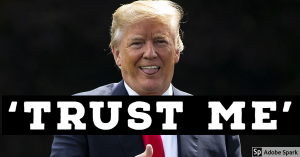The idea of “delaying” elections, even for something as serious as COVID-19, is something that makes many people feel uneasy because of the possibility it could be abused easily, noting similar patterns in other nations. If there is anything that floating such an idea will do, it is likely to lower a politician’s popularity, because people will regard such an act with suspicion. It is with great interest then that Trump has floated the idea of “delaying” elections this year because of COVID-19.
President Donald Trump, lagging in the polls and grappling with deepening economic and public health crises, on Thursday floated the startling idea of delaying the Nov. 3 presidential election. The notion drew immediate pushback from Democrats and Republicans alike in a nation that has held itself up as a beacon to the world for its history of peaceful transfer of power.
Trump suggested the delay as he pushed unsubstantiated allegations that increased mail-in voting due to the coronavirus pandemic would result in fraud. But shifting Election Day is virtually impossible and the very idea represented another bracing attempt by Trump to undermine confidence in the American political system.
The date of the presidential election — the Tuesday after the first Monday in November in every fourth year — is enshrined in federal law and would require an act of Congress to change.
Top Republicans in Congress quickly rebuffed Trump’s suggestion. Senate Majority Leader Mitch McConnell said the election date is set in stone and House GOP leader Kevin McCarthy said the election “should go forward” as planned. Regardless, the Constitution makes no provisions for a delay in the end of Trump’s term — noon on Jan. 20, 2021.
“With Universal Mail-In Voting (not Absentee Voting, which is good), 2020 will be the most INACCURATE & FRAUDULENT Election in history,” Trump tweeted Thursday. “It will be a great embarrassment to the USA. Delay the Election until people can properly, securely and safely vote???”
In fact, only five states conduct elections entirely by mail, although more states expect to rely more heavily on mail-in ballots in November because of the virus outbreak. California has announced plans to send ballots to all registered voters for the fall election, but will also have in-person voting options available.
Trump’s tweet came just minutes after the government reported that the U.S. economy shrank at a dizzying 32.9% annual rate in the April-June quarter, by far the worst quarterly plunge ever, as the coronavirus outbreak shut down businesses, threw tens of millions out of work and sent unemployment surging to 14.7%.
With just over three months until Election Day, Trump trails in the polls nationally and across battleground states, and some surveys even suggest traditionally Republican-leaning states could be in play. While Trump has come back before after trailing consistently in the polls throughout 2016, the survey data has raised the possibility that he could face a landslide loss if he doesn’t turn things around.
Trump has increasingly sought to cast doubt on November’s election and the expected pandemic-induced surge in mail-in and absentee voting. He has called remote voting options the “biggest risk” to his reelection. His campaign and the Republican Party have sued to combat the practice, which was once a significant advantage for the GOP.
There is no evidence of widespread voter fraud through mail-in voting and the states that use it exclusively say they have necessary safeguards in place to ensure that a hostile foreign actor doesn’t disrupt the vote. Election security experts say that all forms of voter fraud are rare, including absentee balloting.
Most states are still finalizing their plans for November. A small number of states sent ballots to voters during the primaries, but most states are not expected to do so in November. Instead, voters will have to request an absentee ballot if they want to vote at home. (source)



